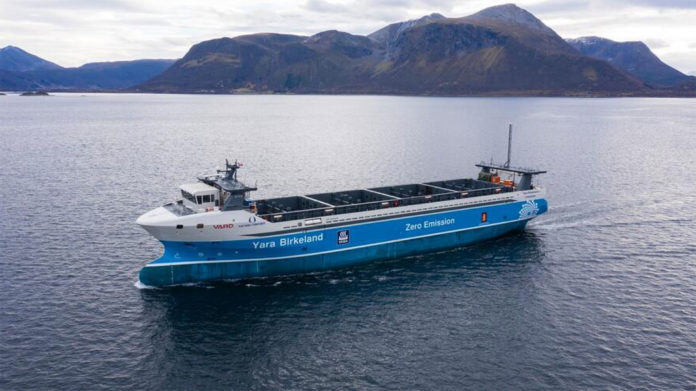When it comes to zero-emission, autonomous cargo transportation, the vehicles that first come to mind are trucks and aircrafts. Now, Yara International expects to sail the first autonomous, fully electric cargo ship in Norway by the end of 2021.
A lot of work is being done to combat climate change on a global scale. Reducing greenhouse gas emissions is one of them. According to the International Maritime Organization, the shipping industry currently accounts for up to 3% of global greenhouse gas emissions. In this context, Yara Birkeland – the world’s first zero-emission, autonomous cargo ship – was developed by a Norwegian company.
The electric, autonomous cargo ship project, which was first implemented as a concept in 2017, has now come to an end. As CNN reports, Yara Birkeland will go on its maiden voyage at the end of this year. The cargo ship will travel from Herøya to Brevik with only three onshore data control centers keeping watch over the journey.
Yara had planned to set sail in 2020, but the COVID-19 pandemic delayed the trip. It’s not the first crewless ship of any kind to move forward, but it is the first all-electric model.
Yara Birkeland features a 7 MWh battery, powering two 900 kW Azipull pods, as well as two 700 kW tunnel thrusters. The ship is expected to travel at a top speed of 13 knots and will carry 103 standard-sized containers. Considering that container ships typically travel at speeds between 16 and 25 knots, the electric ship is a bit slow. It is safe to say the giant 7MWh battery will take a while to charge.
The company says its new vessel will significantly reduce CO2 and nitrous oxide emissions and improve road safety by removing up to 40,000 truck journeys in populated urban areas. Initially, loading and unloading the ship will require humans, but the company wants to make the entire operation crewless. So it will work towards developing autonomous cranes and straddle carriers – vehicles that place containers onto ships.
However, there is still a long way to go before you see autonomous ships making commercial long sea journeys. There are many challenges that need to be overcome – it would be harder for a self-sailing ship to navigate a busy port, and there are also legal issues. Also, different countries have their rules for the sea.
